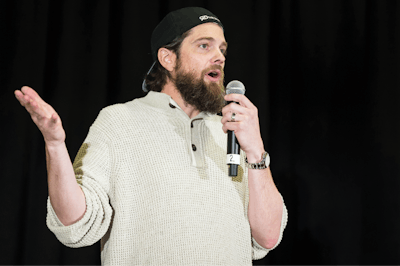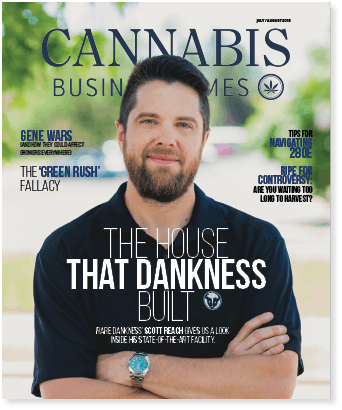
RD Industries/Rare Dankness founder Scott Reach looks back on the two years since the award-winning story on his company was published in Cannabis Business Times. He dishes on working with family, his company’s price-matching capabilities and its international partnerships with Maricann.
Brian MacIver: It’s been two years since you’ve been on the cover of the magazine. What has changed for you and your business?
Scott Reach: The brand is bigger, more diversified. We have established ourselves as one of the most recognized cannabis brands in the world. The facility is incredible, always evolving into a bigger, more advanced version than I started with.
We also are expanding into a few other markets with strategic partners on projects that allow us to expand market share and potentially franchise into the seed-to-sale model. In Canada, we are working on a verified genetics project with Maricann. In Switzerland, we are working alongside Maricann on a CBD/hemp project as an alternative to tobacco cigarettes.
I recently found an equal share partner for the Colorado grow and dispensary, which cleared me of the debt involved with the construction of the facility and left Rare Dankness, as a brand, untouched and in control and with ownership, so I’ve been sleeping better than I have in years.
MacIver: In the July/August 2016 issue, you said, “If you’re not on the technology side of cannabis, you’re just going to be on the farming side, and there’s not a lot of money on the farming side.” Do you still believe that today?

Reach: I most definitely still believe it. It’s been enjoyable watching all the technology retrofits happening within facilities in our own state. I’m called constantly by competitors for consulting needs on technology. Rare Dankness has been able to step into a fully mature market in Colorado where I was known for high-quality, large-scale production from my former days as a grower for local producers. We actually sculpted out a nice chunk of the market for ourselves while changing how the operators across the country build and run their facilities’ [automation and workflow].
MacIver: In 2016, you had built one of the most advanced cultivation facilities in the country. Knowing what you know today, what would you have done differently?
Reach: Hired more college graduates for all my management and department head positions. From my own personal experience, my college grads require the least amount of micromanaging or weekly training sessions. All those positions have a college graduate in place at this time.
As far as building design, we all have our 20/20 moments. There are at least two companies I wouldn’t have worked with because I knew they over-stated their abilities. A common flaw in our society is, “fake it till you make it,” instead of working hard, failing and learning to succeed.
MacIver: How have you handled the price pressures seen in the more mature markets (Oregon, Washington and Colorado)?
Reach: Honestly, our dispensary model is unique; we can price-match the current market price on our higher-quality products, simply thanks to a lack of overhead [that is often caused by being] overstaffed and having better workflow and processes. [There have been] a few moments when [my wife] and I have chosen to drop prices, [and] I’ve said, “You don’t have to go that low.” But then you look at production costs and overhead, and we are still profitable, so why not pass along the savings? I’m not planning on driving a Ferrari anytime soon; I like my truck.
MacIver: You work with your wife, Pamela, at Rare Dankness. What tips can you offer on working with family?
Reach: Don’t bring work home (well, as little as possible). When we are in Colorado at the facility she runs the day-to-day operations as CEO from our office space above our dispensary, I’m in the back helping my main facility lead with whatever day-to-day help we may need in the gardens. Pamela and I see each other on the drive into work and on the drive home, and at night. I rarely see her during the day unless she scrubs in and comes back into the garden.
















